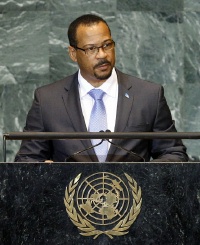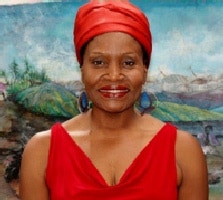Saint Lucia Wants Urgent Climate Change Action
NEW YORK – Saint Lucia, a Caribbean island and a founder of the Alliance of Small Island States (AOSIS), calls climate change the most serious challenge facing mankind today.
Addressing the United Nations General Assembly, Rufus George Bousquet, the island’s Minister for External Affairs, International Trade and Investment, called for an urgent collective response while detailing how his country was working on policies and legislation to develop renewable energy sources, including wind, solar and geothermal sources.
Small island developing states and least developed countries had joined together “to demand, appeal and even beg, if necessary, that the new Copenhagen climate agreement limit temperature increases to the attainable level of 1.5° C, as possibly anything above that will be devastating to our existence,” he told the august body, explaining that Saint Lucia was in “crisis-management mode,” which had to be part and parcel of sustainable development efforts.

Saint Lucia’s Minister for External Affairs Rufus Bousquet addresses the United Nations General Assembly on Monday (Sept 28th).
UN Photo/Erin Siegal
Speaking later during a reception at Saint Lucia’s Mission to the United Nations and Consulate General, Minister Bousquet said climate change was already reducing the yield of food producers in Saint Lucia. “The little fisherman who goes out in a pirogue to do his daily fishing and who finds that the fishing stocks are depleted does not understand the reason why it is happening – it may be overfishing in some countries but certainly climate change is part of that,” he said, adding that the frequency and severity of hurricanes as well as rising sea levels have damaged small island states. “We did not create the problem (because) our (carbon) footprint is so small … and we don’t have the resources to cope with it at this stage,” he said, calling on the donor community to act urgently and meaningfully.
Minister Bousquet, the Parliamentary Representative for the constituency of Choiseul, said being categorized as middle income developing countries has disadvantaged Caribbean nations in attracting resources such as concessionary loans and grants. Other issues that he believes the international community must urgently address include debt relief so that resources can be redirected for the development of the people, the trafficking of illicit weapons through Caribbean waters to the developed world, and deporting criminals back to the Caribbean some of whom now have no connection with the region whence they came.
The Foreign Minister took the opportunity to address nationals in New York and encouraged them to share their knowledge, experience and resources with their home country, in addition to support the rebuilding efforts of St. Jude Hospital, which was recently destroyed by fire.



